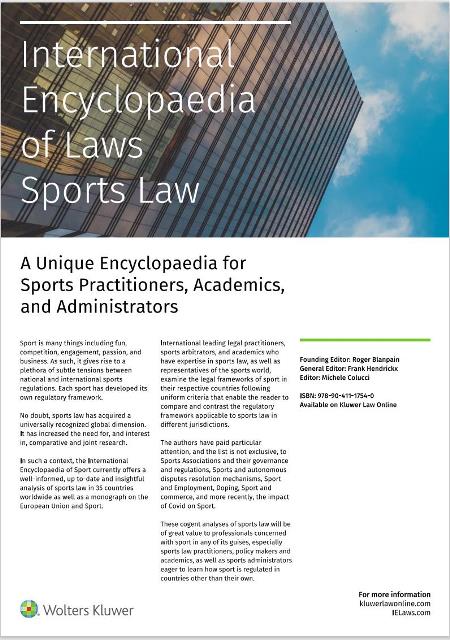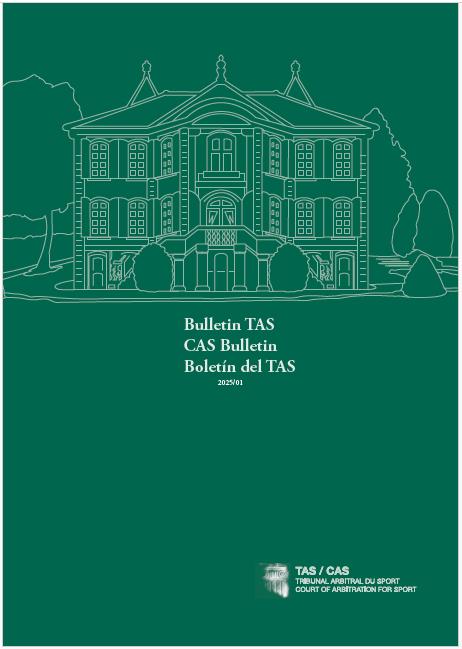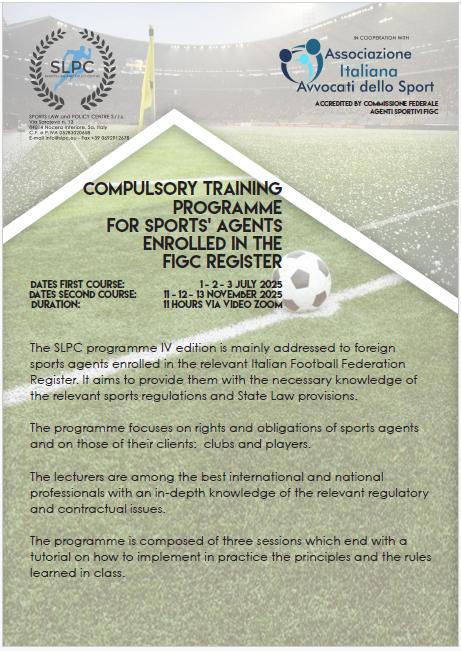IN THE SPOTLIGHT
EU Court of Justice
FIFA Football Agent Regulations (‘the FFAR’) and EU Law
15 May 2025
Opinion of the Advocate General in cases C-209/23, C-428/23, C-133/24 RRC Sports
es -
de -
el -
en -
fr -
it -
pl -
pt -
sl
Advocate General Emiliou: Sports governing bodies are limited in their self-regulation if there is a significant impact on matters governed by EU law
In case C-209/23, the Advocate General is of the opinion that:
“Rules set out in regulations issued by sports associations which concern the activity of football agents are not precluded:
– by Article 101 TFEU, if any appreciable anticompetitive effect that those rules may produce can be justified under the Meca-Medina case-law or exempted under Article 101(3) TFEU;
– by Article 102 TFEU, if those rules genuinely pursue a legitimate objective and are necessary and proportionate to that objective, or the anticompetitive effects produced are counterbalanced or outweighed by advantages in terms of efficiency in the markets affected which also benefit the consumer;
– by Article 56 TFEU if those rules, where they entail a restriction on the freedom to provide services, are justified by a legitimate objective in the public interest which is other than of a purely economic nature and comply with the principle of proportionality, meaning that they are suitable for ensuring the achievement of that objective and do not go beyond what is necessary for that purpose; and
– by Article 6 of Regulation (EU) 2016/679 of the European Parliament and of the Council of 27 April 2016 on the protection of natural persons with regard to the processing of personal data and on the free movement of such data, and repealing Directive 95/46/EC (General Data Protection Regulation), if those which concern the submission of personal data of natural persons and their disclosure to third parties genuinely pursue interests worthy of protection, only concern data that is strictly necessary to that end and do not place an intolerable burden on the data subjects as regards their right to privacy and their financial interests".
In case C-428/23, the Advocate General is of the opinion that:
"Article 101 TFEU must be interpreted as meaning that:
(1) The Meca-Medinaa case-law applies to the regulations of a sports association which concern the use of services of undertakings active in markets upstream or downstream of the activities of that association (or of its members), provided that those services are capable of having a direct and significant influence on the association’s core activities;
(2) The conditions laid down in the Meca-Medina case-law must, in principle, be applied in respect of each rule contained in regulations issued by a professional or sports association unless, because of some specific circumstances, a meaningful assessment requires some or all of those rules to be evaluated in combination. In that context, the degree of proximity or remoteness between the activity of the association and the activity of the third-party undertakings which are affected by the rules is a relevant factor to consider when assessing whether the rules in question are necessary and proportionate in the light of the legitimate objective in the public interest pursued".
In case C-133/24, the Advocate General is of the opinion that:
"Article 101(1) TFEU
must be interpreted as meaning that a no-poach agreement concluded during the COVID 19 pandemic by professional sports clubs, in agreement with their national sports association:
– shall not be classified as restrictive by object, if its genuine rationale was to preserve the fairness and integrity of the sports competition affected by the pandemic; and
– falls within the scope of the Meca-Medina case-law provided that, in particular, it genuinely sought to ensure the integrity and fairness of the sports competition, and it was necessary and proportionate to that objective".
PUBLICATIONS

SLPC 2024
ISBN 978-88-943373-7-2
FLYER
-
TEASER
-
ORDER FORM
International Encyclopaedia of Sports Law
Edited by M. Colucci

FLYER

Rivista di Diritto ed Economia dello Sport 2025
ARTICLE 6(1) ECHR AND INTERNATIONAL SPORTS ARBITRATION:
BETWEEN (CERTAIN) BOUNDARIES AND (YET UNCERTAIN) CONSEQUENCES
by Saverio Paolo Spera
AVAILABLE IN OPEN ACCESS
 Saverio Paolo Spera is an Italian qualified attorney-at-law. He holds a degree in law from the university of Rome ‘La Sapienza’ and an LL.M in International Business Law from King’s College London. He has practiced civil and employment law in Italy for several years and worked at the Asser International Sports Law Centre in the Hague, carrying out research in the field of international sports arbitration, before joining FIFA in 2017. Until May 2024, he was a senior legal counsel within the Litigation Department, representing FIFA before the Court of Arbitration for Sport in more than 150 proceedings. In the spring of 2024, he has co-founded SP.IN Law, a Zurich based international sports law firm.
He regularly publishes articles on issues related to sports law and lectures in international sports law programmes.
Saverio Paolo Spera is an Italian qualified attorney-at-law. He holds a degree in law from the university of Rome ‘La Sapienza’ and an LL.M in International Business Law from King’s College London. He has practiced civil and employment law in Italy for several years and worked at the Asser International Sports Law Centre in the Hague, carrying out research in the field of international sports arbitration, before joining FIFA in 2017. Until May 2024, he was a senior legal counsel within the Litigation Department, representing FIFA before the Court of Arbitration for Sport in more than 150 proceedings. In the spring of 2024, he has co-founded SP.IN Law, a Zurich based international sports law firm.
He regularly publishes articles on issues related to sports law and lectures in international sports law programmes.
Abstract
In the years following the Mutu-Pechstein judgment of the European Court of Human Rights (ECtHR), practitioners in the field of sports law might have noticed a significant increase in the reliance that parties have made on the provisions of the European Convention on Human Rights (ECHR) in their submissions before sports dispute resolution bodies. In particular, a complaint about alleged violations of their right to a fair trial protected by Article 6(1) ECHR has been often brought up in that context. While it is no longer doubted that this provision binds CAS panels in the adjudication of appeals brought before their attention, there is still some degree of approximation regarding the boundaries within which Article 6(1) ECHR finds room for application in the context of international sports arbitration. This paper aims at shedding some light on this and on the (yet uncertain) consequences of a misapplication of the rule in question.
Negli anni che hanno seguito la sentenza Mutu-Pechstein della Corte europea dei Diritti dell'Uomo, gli operatori del diritto sportivo potrebbero aver notato un aumento significativo del ricorso alle disposizioni della Convenzione Europea dei Diritti dell'Uomo (CEDU) da parte delle parti nei loro ricorsi agli organi di risoluzione delle controversie sportive. In particolare, in questo contesto è stata spesso sollevata una denuncia per presunte violazioni del diritto a un processo equo tutelato dall'articolo 6(1) della CEDU. Sebbene non vi siano più dubbi sul fatto che questa disposizione vincoli le formazioni arbitrali del TAS nel giudicare gli appelli sottoposti alla loro attenzione, vi è ancora un certo grado di approssimazione riguardo i confini entro i quali l'articolo 6(1) CEDU trova spazio di applicazione nel contesto dell'arbitrato sportivo internazionale. Il presente contributo intende fare luce su questo aspetto e sulle conseguenze (ancora incerte) di una errata applicazione della norma in questione.
Keywords
ECHR – International sports arbitration – Independent and impartial tribunal – Civil rights and obligations – Adversarial proceedings – Equality of arms – Public hearing – Sports Governing Bodies – Court of Arbitration for Sport – Swiss Federal Tribunal – Swiss public policy.
CEDU – Arbitrato internazionale sportivo – Tribunale indipendente e imparziale – Diritti e doveri di carattere civile – Procedimenti in contraddittorio – Parità di armi – Udienza pubblica – Organi di governo dello sport – Tribunale arbitrale dello sport – Tribunale federale svizzero – Ordine pubblico.
CONFERENCES AND SEMINARS





 Saverio Paolo Spera is an Italian qualified attorney-at-law. He holds a degree in law from the university of Rome ‘La Sapienza’ and an LL.M in International Business Law from King’s College London. He has practiced civil and employment law in Italy for several years and worked at the Asser International Sports Law Centre in the Hague, carrying out research in the field of international sports arbitration, before joining FIFA in 2017. Until May 2024, he was a senior legal counsel within the Litigation Department, representing FIFA before the Court of Arbitration for Sport in more than 150 proceedings. In the spring of 2024, he has co-founded SP.IN Law, a Zurich based international sports law firm.
He regularly publishes articles on issues related to sports law and lectures in international sports law programmes.
Saverio Paolo Spera is an Italian qualified attorney-at-law. He holds a degree in law from the university of Rome ‘La Sapienza’ and an LL.M in International Business Law from King’s College London. He has practiced civil and employment law in Italy for several years and worked at the Asser International Sports Law Centre in the Hague, carrying out research in the field of international sports arbitration, before joining FIFA in 2017. Until May 2024, he was a senior legal counsel within the Litigation Department, representing FIFA before the Court of Arbitration for Sport in more than 150 proceedings. In the spring of 2024, he has co-founded SP.IN Law, a Zurich based international sports law firm.
He regularly publishes articles on issues related to sports law and lectures in international sports law programmes.
